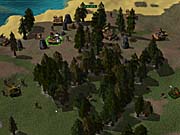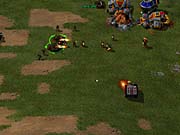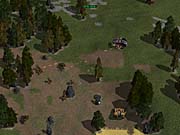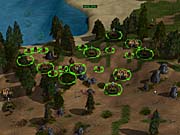Sovereign Preview
We're back from the Verant offices with new details about this upcoming online RTS.

"We were naïve in thinking that an online strategy game would be as easy to make as EverQuest," says Clint Worley, producer of Verant's upcoming massively multiplayer real-time strategy game, Sovereign. For die-hard fans of strategy games, development on Sovereign has taken too long. The game was officially announced almost two years ago, and it promised interactivity with the player--a kind of interactivity that the strategy genre had never seen before. If your base fell under siege after you logged off, Sovereign would make numerous attempts--including e-mail, instant messaging, and paging--to inform you so that you could log back into the game and fight off the invaders. Sovereign was to be the strategy gamer's dream come true, taking design queues from the classics of its genre, such as Starcraft and Command & Conquer, while banking on the knowledge of online play that Verant learned from its first success story, EverQuest.

But that was two years ago. When Sovereign was shown at the 2000 E3 in Los Angeles, the game looked overly simplistic, and its graphics technology was already showing signs of age. It's obvious that the designers headed back to the drawing board, because since then, Verant has revealed almost nothing of Sovereign. A few weeks ago, however, we were invited down to the company's San Diego offices to get a firsthand look at the game, and the Sovereign that we saw was certainly not the Sovereign that disappointed so many at last year's E3. Obviously, the biggest difference between this new game and the Sovereign of old is the enhanced graphics. Originally, the game was designed to take advantage of the lowest common denominator in terms of system requirements. Basically, Sovereign was optimized for the now long obsolete 3dfx Voodoo Graphics chipset. Its 3D engine has since been heavily reworked to accommodate features such as units that cast real-time articulating shadows; terrain-blending between tiles of grass, desert, granite, and water; and a fractal-generated world to ensure an infinite number of maps. Since the game isn't due out until sometime in 2002, it'll take full advantage of Nvidia's GeForce III chipset and make use of graphics technology that will be considered cutting edge a year from now so that it doesn't look dated before it even ships.
But more impressive than the graphics is the game's promise of wars, which will last weeks and involve thousands of units. Thousands? That's not an exaggeration. Worley gave us a demo of a map that was designed to accommodate 32 online players. Each player has the ability to produce a maximum of 100 units, for a total possible of 3,200 units engaged in battle at once. Think that's a lot of commotion? Then consider that Sovereign will have worlds large enough for 500 simultaneous players. That's 50,000 units, all in one place, all blasting away at each other, all after the same goal of total world domination. This brings up some interesting questions for the designers at Verant, however. Namely, how do you manage communication between all these players? What happens to a player's units once he or she logs off? And most importantly, why would anyone pay every month to play a real-time strategy game when he or she can play on Battle.net or Westwood Online for free? Every day, Worley and his team discover new answers to these old questions, gradually improving upon Sovereign's original concept. "We have no shame in telling you that we took some design cues from Ultima Online when we were making EverQuest," confesses Worley, "and jokingly, we wish that someone would release an online strategy game before we do so that we could learn from their mistakes." Pioneering the established RTS genre into the online world certainly isn't easy, but from what we saw of Sovereign, we have no doubt that Verant will succeed in doing so--with or without a guinea pig from a competitor.
Your Home World

One of the biggest factors differentiating Sovereign from most other persistent online games is that it's being designed from the ground up to be a player-vs.-player game. There will certainly be some nonplayer characters in the game, but the brunt of the gameplay is focused on killing your fellow player. Having said that, there are safe zones. Worley explains that there have to be safe zones: "If a player logs off and comes back to find his [or her] base destroyed, he [or she] rightfully wouldn't want to play the game anymore." These safe zones are represented by your homeworld. It's here that most of the really persistent aspects of Sovereign--such as research and development and production--take place. Worley describes the homeworld, which can be seen as a planet from an orbital view, as a visual representation of yourself and your progress. Sovereign is a real-time strategy game, and in a typical RTS, you can't see your actual character, which detracts a certain personal touch from the game. The homeworld, essentially, is your character, and just like you're able to distinguish a high-level player in EverQuest, you'll be able to discern anyone's progress in Sovereign simply by taking a quick glance at his or her homeworld. For example, if you focus your resources on production, you'll be able to see large, dark industrial cities litter your continents, whereas if you research new technology, your landscape will be dotted with clean cities and glass high-rises. Incidentally, while your homeworld is immune from external attack, other players can launch espionage missions against you, but the most damage that can be done is that you will lose a few trade secrets or have a slight reduction in your production, research, or both.

All the actual combat in Sovereign takes place on the game's excursion worlds. It's here where you'll be able to launch attacks against other players, ally with others, and defend against the rest. These battles can last for hours at a time and they're all part of a larger war, so you can lose some battles but still succeed in the greater effort. And while the battles themselves make up the tactical aspect of Sovereign, all the real strategy takes place when you're deciding what to bring to the excursion world from your homeworld. Because while the homeworld is where you'll research new technology and new units, you'll be allowed to bring only a limited number of these units onto the battlefield. And while you'll have the ability to build additional units once you reach the excursion world, you'll also have a limit on how many of these you'll be allowed to bring back. Worley says that the game is designed in this manner to prevent you from simply making as many units as you want and then transporting them back to your homeworld. Sovereign won't even let you make multiple trips between the excursion world and your homeworld. Once you leave the battlefield, any assets that you left behind are fair game for other players to plunder. It's like leaving a valuable piece of armor on the ground in EverQuest, logging off, and returning in the hopes of finding it in the same place.
The units themselves resemble real-world vehicles that have been infused with a touch of sci-fi flair, much like the units found in the Command & Conquer games. The game has a wide variety of units, and each falls within one of five different classes, depending on the military tradition that you choose to follow when first creating your empire. These military traditions--assault, stealth, defense, siege, and raider--will determine the look and behavior of your units. Naturally, stealth units are a lot faster and quieter than defense units, but they have nowhere near their level of armor. When you start the game, you'll also have to choose from a civil tradition: economist, researcher, politician, industrialist, and espionage. These will dictate how your homeworld will function. For example, if you're an economist, you'll have access to financial tools that will track stocks and watch for certain market trends in Sovereign's Galactic Trade Market--noneconomist players will be able to only buy and sell.
Interdependence

Since Sovereign is a persistent game--which means that your character and your world will gradually gain experience levels and improve in its respective military and civil traditions--one of Worley's biggest fears is that new players will easily be overpowered with those who have been playing Sovereign for a while. To combat this prevalent crux of massively multiplayer games, Sovereign will have in place a series of house alliances. Each house contains a number of player-run guilds, only one of which can be in control of the house. While Worley didn't comment on exactly what it takes for a certain guild to rise in power over all the others, just the fact that only a single group of people will control the fate of a majority of others will undoubtedly lead to numerous political feuds, something that Worley would like to see a lot of in Sovereign. Players can also choose to leave their house altogether and form a band of mercenaries. The benefits of doing so is freedom to operate however you choose, but the downside, obviously, is a decrease in the level of protection that you'd normally receive from a house. Either way, player interdependence will play a major role in the day-to-day operations of a house, as well as on the battlefield itself. After all, an experienced player whose experience and military tradition is in defense still needs to ally with a player who's strong in assault, siege, or raider tradition if he or she hopes to conquer anyone in the game. Allying will not only let you pool resources with other players, but it will also let you share units. However, giving a player with a tradition in raiding some defense units won't mean that he or she will be as proficient with them as you would be. Worley equates this as the United States selling F-16s to Israel: Just because an ally owns the same hardware that the US owns, it doesn't mean their pilots are the equal of our Viper drivers.

Verant is further making Sovereign accessible to a broad audience by making sure that everything about the game is server-side to minimize the amount of client-side hacking that can take place. To quote Worley, "Anything client-side will screw you." Even something as inconsequential as the tutorial to EverQuest was originally hacked by players because it was a client-side feature, and judging by the rampant cheats that currently plague games like Counter-Strike, Verant's approach to Sovereign will certainly be welcomed by all.
Additionally, Sovereign will be the first Verant game to have worldwide servers at the time of its release, which, obviously, will make the game just as accessible to our fellow gamers in Europe, Asia, and Australia. So while Sovereign might not be sending you a fax to let you know of an impending attack on your base or paging you to inform you of a drop in resource production, the game will nonetheless be a revolutionary step for the real-time strategy genre when it releases. Currently, Worley has no firmer date than "2002." Incidentally, whenever Sovereign ships, you won't be expected to pay another $9.95 per month to play it online. After all, with games such as The Shadows of Luclin, PlanetSide, and Star Wars Galaxies, Verant is going to have an entire arsenal of compelling online games that will undoubtedly attract gamers from all walks of life, and the company certainly won't expect them to pay a separate monthly fee for each of these games. Instead, the company will establish an umbrella subscription program similar to that of EA.com's, which will let you pay one flat monthly flee and have access to all its games. Exact details of that program are still a well-guarded secret, but as more information about it and of Sovereign are released, you'll be the first to know.
Got a news tip or want to contact us directly? Email news@gamespot.com
Join the conversation